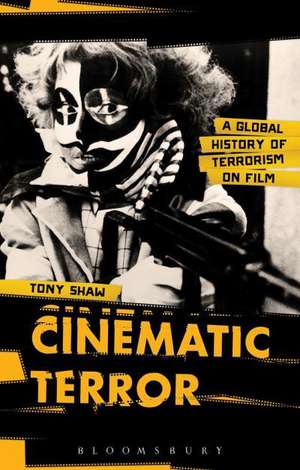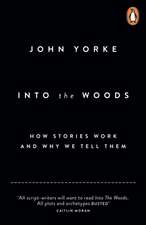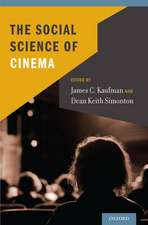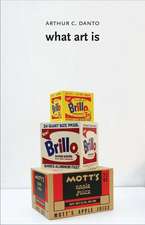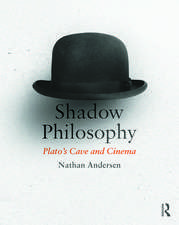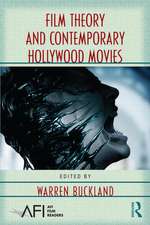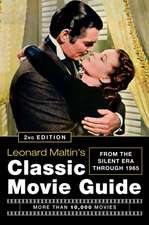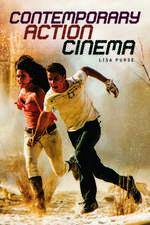Cinematic Terror: A Global History of Terrorism on Film
Autor PhD Tony Shawen Limba Engleză Paperback – 14 ian 2015
| Toate formatele și edițiile | Preț | Express |
|---|---|---|
| Paperback (1) | 194.96 lei 3-5 săpt. | |
| Bloomsbury Publishing – 14 ian 2015 | 194.96 lei 3-5 săpt. | |
| Hardback (1) | 834.28 lei 6-8 săpt. | |
| Bloomsbury Publishing – 14 ian 2015 | 834.28 lei 6-8 săpt. |
Preț: 194.96 lei
Preț vechi: 224.78 lei
-13% Nou
Puncte Express: 292
Preț estimativ în valută:
37.30€ • 38.95$ • 30.81£
37.30€ • 38.95$ • 30.81£
Carte disponibilă
Livrare economică 25 martie-08 aprilie
Preluare comenzi: 021 569.72.76
Specificații
ISBN-13: 9781441196200
ISBN-10: 144119620X
Pagini: 328
Ilustrații: 60 bw illus
Dimensiuni: 152 x 229 x 23 mm
Greutate: 0.52 kg
Editura: Bloomsbury Publishing
Colecția Bloomsbury Academic
Locul publicării:New York, United States
ISBN-10: 144119620X
Pagini: 328
Ilustrații: 60 bw illus
Dimensiuni: 152 x 229 x 23 mm
Greutate: 0.52 kg
Editura: Bloomsbury Publishing
Colecția Bloomsbury Academic
Locul publicării:New York, United States
Caracteristici
Contains in-depth studies of key movies; mapping the contours of cinematic terrorism using archival evidence.
Notă biografică
Tony Shaw is Professor of Contemporary History at the University of Hertfordshire, UK. He is an internationally-recognized expert in the fields of history, film and propaganda.
Cuprins
AcknowledgementsIntroductionChapter 1. Silent revolutionariesChapter 2. Agents of suspenseChapter 3. Symbols of resistanceChapter 4. Epic freedom fightersChapter 5. Newsreel guerrillasChapter 6. Docu-death squadsChapter 7. Schlock and aweChapter 8. Avant-garde narcissistsChapter 9. Serial killersChapter 10. Bollywood's communalistsChapter 11. Biopics for peaceChapter 12. Networked jihadistsChapter 13. Suicide victims in close-upChapter 14. YouTube monstersConclusionBibliographyFilmography
Recenzii
A highly readable and informative volume ... Cinematic Terror hence represents not only a stimulating read for film scholars and experts of cultural history and terrorism, but its practical subdivision into fourteen chapters, each dealing with an individual film and a sociohistorical context, also makes it useful teaching material.
Cinematic Terror sets out the main contours of portrayals of terrorism in the cinema, and delves deeply into the complex relationship between terrorism, filmmaking, and public opinion.
Terrorism is central to the international politics of our age. The mass media are central to terrorism. Given these two facts it is surprising that scholars have failed to delve deep into the treatment of terrorism by the most potent mass media of the past century: the cinema. Until now, that is. In this path-breaking book Tony Shaw opens the history of the representation of terrorism in global feature film. Shaw moves deftly across time, geographical space and genre with a series of well-chosen and flawlessly executed case studies. The films considered range from masterpieces by some of the greatest directors of all time, including Alfred Hitchcock himself, to crude exploitation flicks by way of blockbusters, epics, art house and even Bollywood. With meticulous research, unfailing insight and scrupulous balance and objectivity Shaw is an eloquent and insightful guide to this important subject. Seasoned scholars, students of film and security issues and general readers alike will find much to compel attention and provoke further thought in this important book.
An excellent account of the long history of terrorism as depicted on film-a major contribution to the field. Tony Shaw does a fine job not merely in introducing and scrutinizing the discussed movies, but in placing those movies and similar ones, their creators, their supporters, their opponents, and their audiences into the political, sociological, and cultural domestic and/or global contexts of their respective time periods. Most striking is the extent to which cinematic terrorism has related at all times to real life violence of this sort and, taken together, has provided more diverse and compelling portrayals of terrorists, their grievances, and their motives than one would find over time in news media reports.
Tony Shaw has produced an important and ground-breaking study of how cinema has represented international terrorism from the start of the twentieth century to the present. What particularly stands out about this excellent book is the breadth of its coverage and the historical rigour that Shaw brings to his subject. Cinematic Terror is both a highly original piece of film-historical scholarship and a very timely work that has relevance to the world today.
Cinematic Terror sets out the main contours of portrayals of terrorism in the cinema, and delves deeply into the complex relationship between terrorism, filmmaking, and public opinion.
Terrorism is central to the international politics of our age. The mass media are central to terrorism. Given these two facts it is surprising that scholars have failed to delve deep into the treatment of terrorism by the most potent mass media of the past century: the cinema. Until now, that is. In this path-breaking book Tony Shaw opens the history of the representation of terrorism in global feature film. Shaw moves deftly across time, geographical space and genre with a series of well-chosen and flawlessly executed case studies. The films considered range from masterpieces by some of the greatest directors of all time, including Alfred Hitchcock himself, to crude exploitation flicks by way of blockbusters, epics, art house and even Bollywood. With meticulous research, unfailing insight and scrupulous balance and objectivity Shaw is an eloquent and insightful guide to this important subject. Seasoned scholars, students of film and security issues and general readers alike will find much to compel attention and provoke further thought in this important book.
An excellent account of the long history of terrorism as depicted on film-a major contribution to the field. Tony Shaw does a fine job not merely in introducing and scrutinizing the discussed movies, but in placing those movies and similar ones, their creators, their supporters, their opponents, and their audiences into the political, sociological, and cultural domestic and/or global contexts of their respective time periods. Most striking is the extent to which cinematic terrorism has related at all times to real life violence of this sort and, taken together, has provided more diverse and compelling portrayals of terrorists, their grievances, and their motives than one would find over time in news media reports.
Tony Shaw has produced an important and ground-breaking study of how cinema has represented international terrorism from the start of the twentieth century to the present. What particularly stands out about this excellent book is the breadth of its coverage and the historical rigour that Shaw brings to his subject. Cinematic Terror is both a highly original piece of film-historical scholarship and a very timely work that has relevance to the world today.
